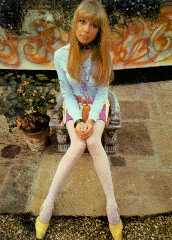"Trans Addiction" from the album CRAZED + DAZED by DJ Insane and The G-Man
on Delvian Records.
Dance like crazy!
Reproduced with kind permission of The G-Man.
The best of East & West Culture. Ununsual music, movies, short films, documentaries, books, poems et al. Stuff that the mainstream has forgotten or chooses to ignore.
"Trans Addiction" from the album CRAZED + DAZED by DJ Insane and The G-Man
on Delvian Records.
Dance like crazy!
Reproduced with kind permission of The G-Man.


Dr Rajkumar (real name: Singanalluru Puttaswamayya Mutturaju (April 24, 1929—April 12, 2006) was one the most popular actor in Kannada film industry. He was an icon in Karnataka and was seen as a role model to millions of Kannadigas.
"Dr. Raj" or "Annavru" (big brother) to millions of his fans, he was sometimes called the John Wayne of South Indian cinema. He acted in more than 200 movies over 50 years in Kannada. He was also a well-known singer, as a playback singer as well as of devotional songs.
Here he sings and English song "If You Come Today" in his own inimitable style.
Hugely enjoyable.
The complete lyrics for interested souls.
If you come today, it is too early
If you come tomorrow, it is too late
you pick your time,
tick tick tick tick a tick tick tick tick
tick tick tick tick a tick tick tick tick
Daaarling!
If you come today, it is too early
If you come tomorrow, it is too late
Did you say morning? No NO its not good
Did you say evening? NO NO its too bad
Did you say noon? No No its not the time
What did you say? Hey What did you say?
Nothing? You pick the time...
tick tick tick tick a tick tick tick tick
tick tick tick tick a tick tick tick tick
Daaarling!
If you come today, it is too early
If you come tomorrow, it is too late
Million times beating my heart
Million dreams haunt my heart
Million desires swing in my heart
Million memories seize my heart
Million times beating my heart
Million dreams haunt my heart
Million desires swing in my heart
Million memories seize